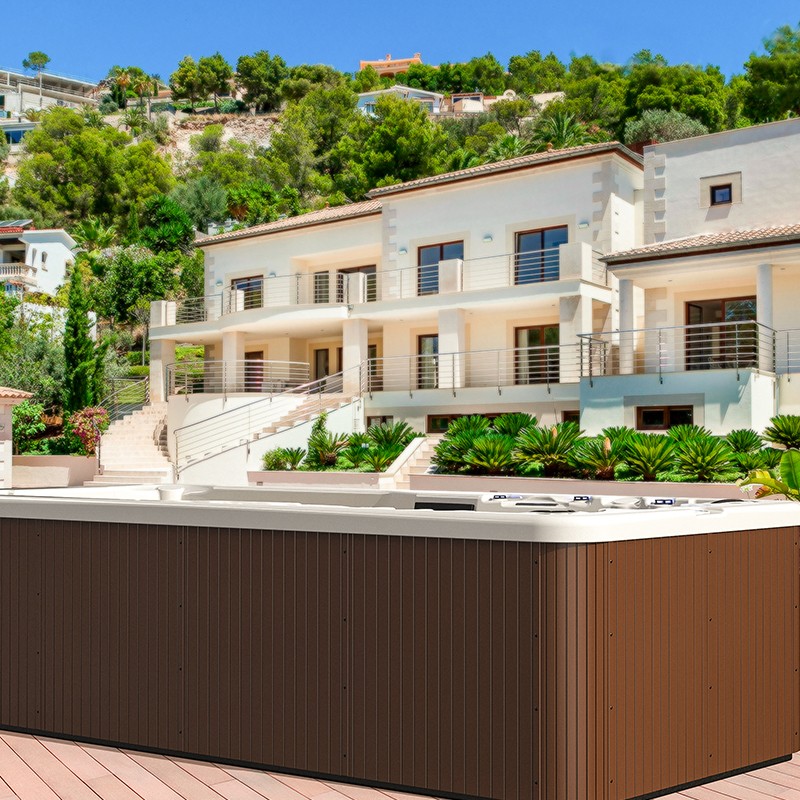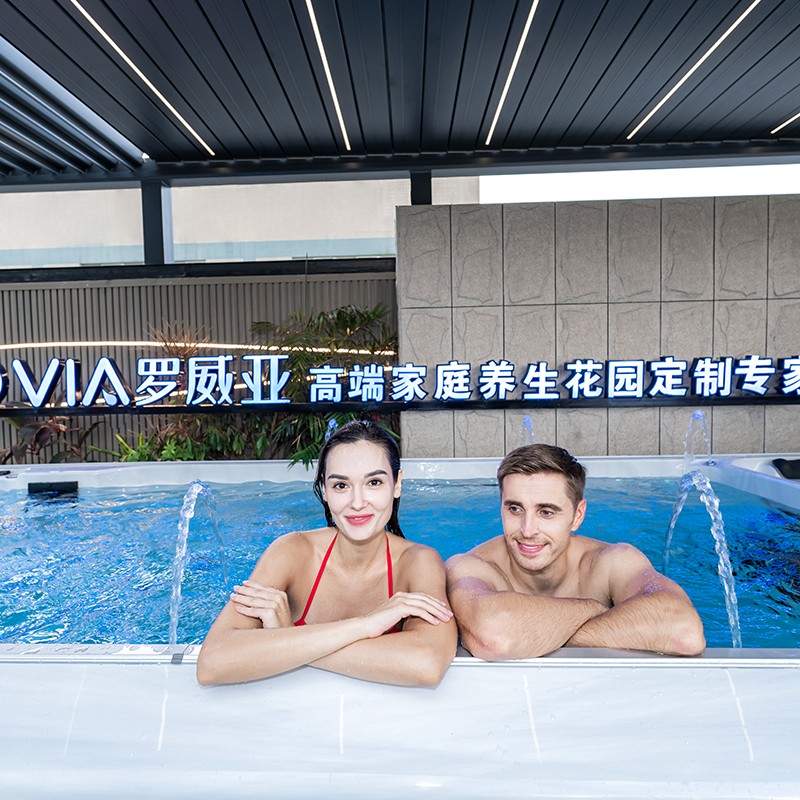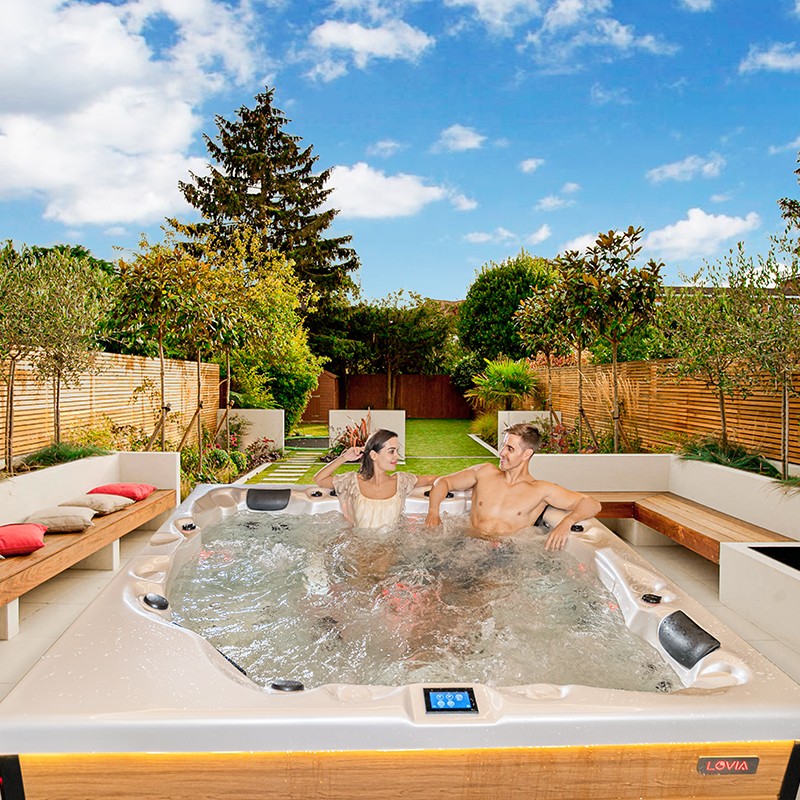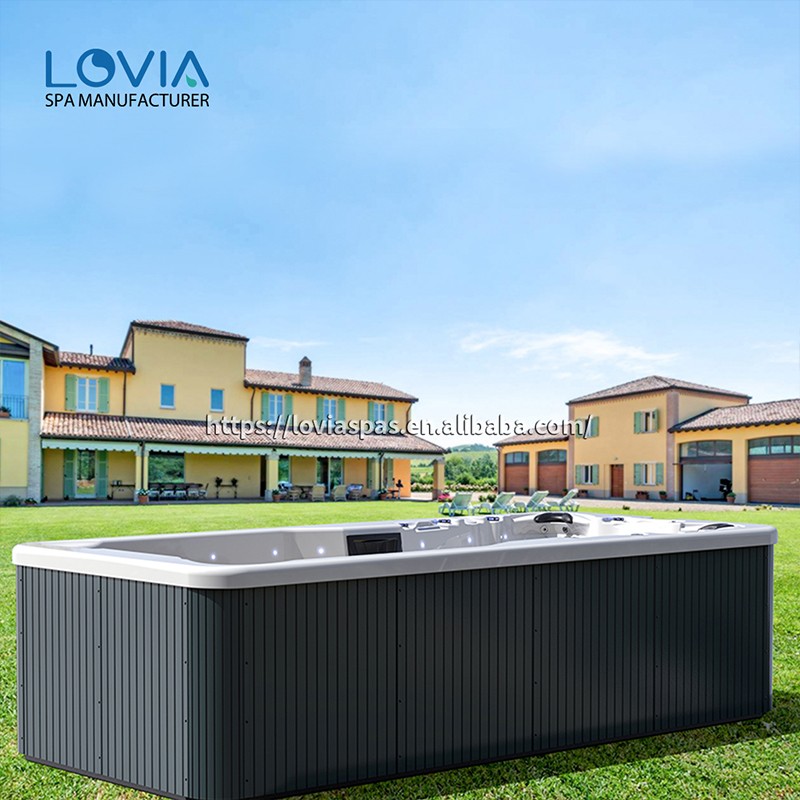
Is 40 degrees Celsius too hot for a swim spa hot tub?
2025-11-24 15:35When enjoying a comfortable and relaxing bathing experience, water temperature is one of the key factors determining comfort and safety. Especially when using a swim spa hot tub, the appropriate water temperature not only affects the user experience but also energy consumption, safety, and the body's physiological responses.
Many people ask when setting the temperature: "Is 40 degrees Celsius too hot for a swim spa hot tub?"
This article will analyze this question from a professional perspective, exploring the ideal water temperature range, the body's response to different temperatures, the intended use, and differences in individual users, helping you to scientifically and rationally set the temperature of your swim spa hot tub.

Why is the water temperature of a swim spa hot tub so important?
The design of a swim spa hot tub combines the functions of a traditional swimming pool and a spa jacuzzi, therefore, water temperature control needs to balance both "exercise" and "relaxation" purposes.
Water that is too cold can cause muscle tension, affecting the relaxation effect; while water that is too hot may cause cardiovascular burden, dehydration, or even heatstroke risks.
Water temperature not only affects physical sensations but also directly impacts several aspects:
• Energy consumption and equipment lifespan: High temperatures increase the load on the heating system, leading to higher energy consumption. Maintaining temperatures above 40 degrees Celsius for extended periods may shorten the equipment's lifespan.
• User comfort: Suitable water temperatures help relax muscles and promote blood circulation; however, excessively high temperatures can cause increased heart rate, excessive sweating, and fatigue.
• Water quality maintenance: High temperatures accelerate the volatilization of chemicals in the water, affecting the stability of disinfectants and increasing maintenance difficulty.
Therefore, water temperature for a swim spa hot tub is not merely a matter of "hot or cold," but a comprehensive factor affecting experience, safety, and equipment management.
Is 40 degrees Celsius too hot for a swim spa hot tub?
A water temperature of 40°C (approximately 104°F) is close to the upper limit of what the human body can safely tolerate.
According to industry standards for hot tubs, most manufacturers recommend a safe water temperature of 38°C to 40°C. Exceeding this range, especially with prolonged soaking, poses potential health risks. Physiological Response Analysis
• Blood Pressure and Heart Rate: When the water temperature rises to 40°C, blood vessels dilate and heart rate increases. This stimulation can be dangerous for people with cardiovascular disease or low blood pressure.
• Difficulty in Thermoregulating: The human body heats up rapidly in 40°C water, making it difficult to dissipate heat, which may lead to dizziness, nausea, or dehydration.
• Metabolic Burden: In an overheated environment, the body cools down by sweating, but sweating is not easily noticeable in water, increasing the risk of dehydration.
Therefore, while 40 degrees Celsius is theoretically acceptable, it is already too hot for most users and is not suitable for prolonged use.

What is the Ideal Temperature for a Swim Spa Hot Tub for Different Purposes?
Since the swim spa hot tub combines the functions of an "exercise pool" and a "hydrotherapy massage," the required water temperature varies depending on the purpose. The following are recommended temperature ranges based on the usage scenario:
Purpose of Use | Recommended temperature range | Instructions |
| Swimming training | 26°C–30°C | Maintains vitality and avoids overheating; suitable for sustained exercise |
| Aquatic therapy or rehabilitation | 32°C–36°C | Helps relax muscles and relieve joint stiffness |
| Spamming massage relaxation | 36°C–38°C | Simulates a hot spring experience, promoting blood circulation |
| Short hot bath experience | 39°C–40°C | Can be experienced briefly, but should be limited to 10-15 minutes |
As can be seen from the table, 40 degrees Celsius is only suitable for short soaks and is not recommended as a normal temperature.
If you want to exercise and relax simultaneously in a swim spa hot tub, choose a compromise temperature of 34°C–36°C. This will keep you comfortable without overheating.
What are the potential risks of a 40°C swim spa hot tub?
1. Will it cause dehydration or heatstroke?
Yes. Prolonged immersion in 40°C water will cause you to sweat continuously, but this may not be noticeable. If you don't replenish fluids promptly, dehydration may occur.
Symptoms of dehydration include dizziness, weakness, dry mouth, and rapid heartbeat. In severe cases, it can even lead to mild heatstroke.
2. What are the effects on the cardiovascular system?
High temperatures increase the burden on the heart, dilate blood vessels, lower blood pressure, and increase heart rate. For people with high blood pressure, coronary heart disease, or diabetes, a 40°C water temperature may cause discomfort or even danger.
Therefore, doctors usually recommend that heart patients keep the water temperature in their swim spa hot tub below 36°C.
3. Will it affect skin health?
High temperatures can damage the skin's natural oil layer, leading to dryness, sensitivity, and even itching. Prolonged bathing in 40°C water can impair the skin barrier.
For those with sensitive skin or skin conditions, the water temperature should be kept between 35°C and 37°C.

How to determine if the temperature of a swim spa hot tub is suitable for you?
Everyone's heat tolerance is different, so the "suitable temperature" should be adjusted based on individual differences. Here are some guidelines:
• Feel comfortable, not scalding: If you feel a burning sensation or shortness of breath after entering the water, the temperature is too high.
• Feel relaxed after 10 minutes of continuous use: If you feel dizzy, tired, or have a rapid heartbeat after soaking for 10 minutes, cool the water down immediately.
• Use a thermometer for accurate measurement: Don't rely solely on your senses; use the built-in temperature control system of the swim spa hot tub or an individual thermometer.
Furthermore, children, the elderly, pregnant women, and those with chronic illnesses should pay special attention to the temperature setting and should not use water temperatures exceeding 38°C.
What are some practical tips for temperature control in a swim spa hot tub?
To ensure safety and comfort, please follow these temperature control suggestions:
1. Gradually Increase Temperature
When using for the first time, start at 34°C and increase the temperature by 1–2°C each time until you find the most comfortable temperature.
Avoid heating to 40°C all at once, as your body temperature regulation may not be sufficient.
2. Control Soaking Time Appropriately
At high temperatures, it is recommended that the soaking time not exceed 15 minutes. If you wish to extend the usage time, you can lower the temperature to around 36°C.
3. Maintain Hydration
Drink water before and after using the swim spa hot tub to avoid dehydration. You can drink warm water or electrolyte-rich beverages.
4. Regularly Check the Heating System
High-temperature operation increases the load on the equipment. The filtration system and heating elements should be checked regularly to prevent overheating and malfunction.
5. Proper Use of the Cover and Insulation Layer
When not in use, covering the swim spa hot tub with the insulation cover reduces heat loss, lowers energy consumption, and prevents dust contamination.
Why do some people like to heat the swim spa hot tub to over 40 degrees Celsius?
Some users believe that higher temperatures provide a stronger "sauna-like relaxation." However, this practice is not scientifically sound.
While high temperatures can indeed stimulate capillary dilation and promote blood circulation, they can also increase the burden on the body. The risks are higher, especially when using it for extended periods or after consuming alcohol.
From a professional perspective, 38°C is the optimal upper limit for relaxation. Exceeding this temperature will not significantly improve comfort and may even cause discomfort.

What safety precautions should be taken when using a swim spa hot tub?
• Avoid eating too much or drinking alcohol before use. Alcohol dilates blood vessels, and combined with a high-temperature environment, this may lead to fainting.
• Do not use alone. If you suddenly feel unwell, someone should be present to assist you.
• Keep children away from the tub. Children have poor thermoregulation and are more prone to dehydration or dizziness due to high temperatures.
• Regularly change and test the water quality. High temperatures accelerate bacterial growth, so ensure the disinfection system is functioning properly.
• Use non-slip mats and handrails. Hot water can cause skin to sweat and become slippery, so take precautions.
How to adjust the temperature of the swim spa hot tub in different seasons?
• Summer use: It is recommended to maintain a temperature of 28°C–32°C for both coolness and relaxation.
• Winter use: The temperature can be increased to 36°C–38°C to combat the cold, but avoid prolonged use of water temperatures above 39°C.
• Nighttime use: Body temperature is lower at night, so the temperature can be increased by 1–2°C, but should still not exceed 38°C.
This seasonal adjustment method is both energy-efficient and keeps the body comfortable.
Is 40 degrees Celsius too hot for a swim spa hot tub?
40 degrees Celsius is indeed too hot for a swim spa hot tub. While it may not cause serious problems in the short term, prolonged or frequent use can have adverse effects on the body and the equipment.
The ideal water temperature range should be set according to the intended use and individual physical condition:
• Exercise training: 26°C–30°C
• Therapeutic relaxation: 34°C–37°C
• Short hot bath experience: Not exceeding 40°C and limited to 10–15 minutes
Mastering the correct temperature control principles ensures both a comfortable experience with the swim spa hot tub and protection for your health and the equipment.
Therefore, if you are seeking a spa experience that emphasizes both relaxation and wellness, 38°C is a more scientific and safer choice.
What Certifications Does LOVIA SPA Hold?
LOVIA SPA products are certified with CE, ETL, SAA, ROHS, REACH, and ISO9001 standards. These international approvals prove our commitment to safety, durability, and environmental responsibility. Buyers importing from our factory can easily pass customs and product inspections.
As a trusted supplier, we guarantee compliance with your country’s regulations. Purchasing certified spas ensures long-term reliability and customer confidence.
